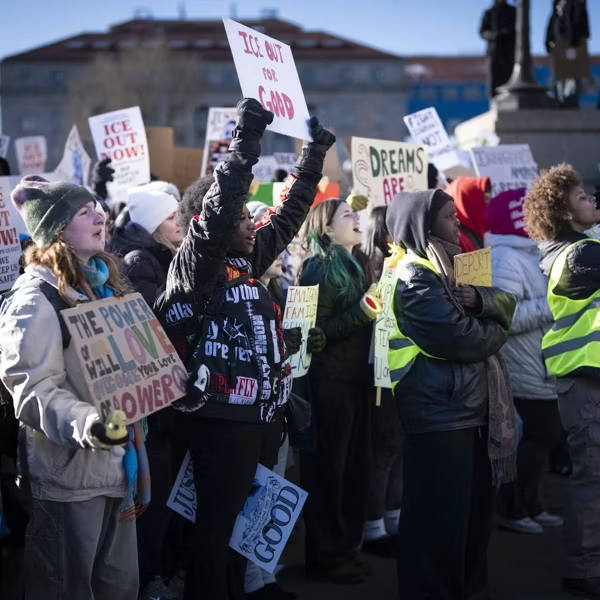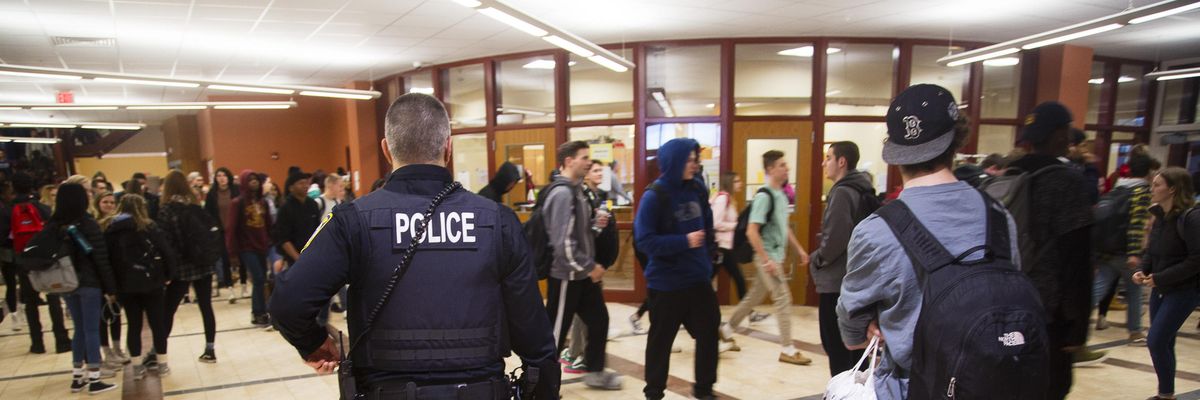Rep. Ayanna Pressley and Sen. Chris Murphy on Thursday announced reintroduced legislation to direct budget resources away from police presence in public schools and instead toward providing students with "trauma-informed services"--an approach the lawmakers say will put student well-being over criminalization.
The bicameral legislation, entitled the Counseling Not Criminalization in Schools Act, is co-led by by Sens. Elizabeth Warren (D-Mass) and Tina Smith (D-Minn.) and Reps. Ilhan Omar (D-Minn.) and Jamaal Bowman (D-N.Y.) and came amid growing calls to overhaul policing in the nation.
"For years," Pressley (D-Mass.) said at a press conference announcing the bill, "we have heard from young people and parents, we've witnessed viral and horrific footage of the unacceptable abuse, humiliation, and trauma that our young people experience due to the growing presence of law enforcement in our learning communities," and it's happening "all across our country."
"For too long our education system has been intertwined with the criminal legal system and the results have been tragic, particularly for our most vulnerable students," she said. "Black and brown students, LGBTQ+ students, and students with disabilities are disproportionately criminalized for normal adolescent childhood behavior and put on a pathway to confinement."
"Unless we disentangle our education and criminal legal system, our students will continue to face unspeakable hurt and horror," Pressley added, and put blame for the situation on "decades of failed budget choices... and policy violence."
A bill summary from the lawmakers points to research showing why the legislation is sorely needed. "Schools with police officers reported nearly 3.5 times more arrests than schools without police," the document states. "Students of color and students with disabilities are more likely to go to a school with a police officer, more likely to be referred to law enforcement, and more likely to be arrested at school."
"When we put a counselor in a school, we're sending a message that our children deserve nurturing and support."
Pressley and Murphy's (D-Conn.) bill aims to rectify that situation by barring the use of federal funds for maintaining police in schools and investing $5 billion to help schools hire counselors, social workers, and other "trauma-informed support personnel."
Bowman asserted that "stationing police officers in places of learning creates an environment of criminalization from an early age--making it more challenging for our children to focus on their learning, growth, and unlocking their full potential."
"When we put an officer in a school, we're sending a message that our children require surveillance. When we put a counselor in a school, we're sending a message that our children deserve nurturing and support," he said.
The legislation is endorsed by a broad group of advocacy groups including the ACLU, Children's Defense Fund, NAACP, and National Education Association.
If the bill is enacted, National Center for Youth Law said it would show the "nation has begun to invest in what actually works to keep our kids safe and in school--counselors, social workers, restorative justice staff, and other behavioral support personnel--and will also mean the nation is stepping away from what doesn't work: harmful and punitive police in schools."




